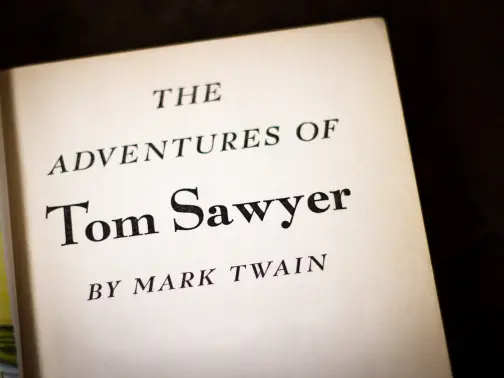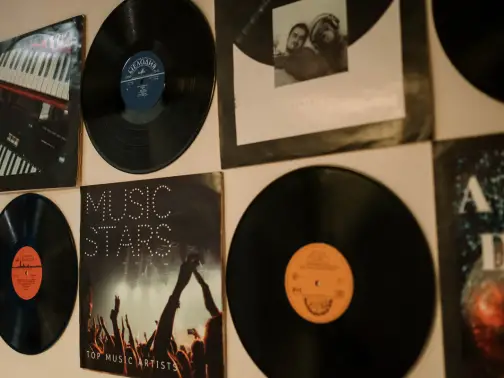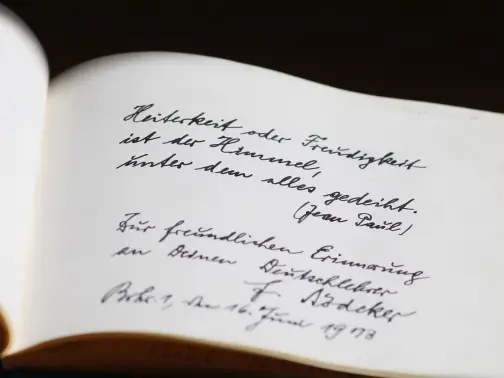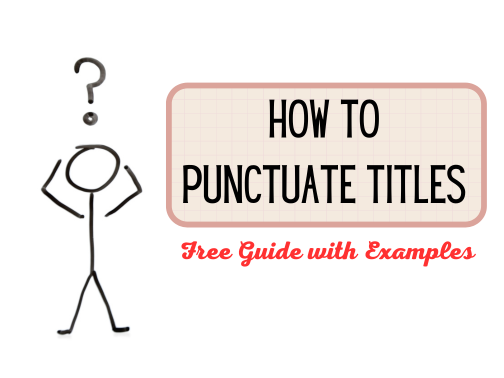Contents
Toggle
Meet David De’ Ath, founder, editor, and writer at Wonderful World English. With his extensive background as an English teacher, David provides valuable insights and practical tips on ESL for students and teachers alike.
In the meticulous art of writing, the punctuation of titles is a subtle yet crucial element that can significantly influence a reader’s perception and engagement with the content.
Whether it is a book, an academic paper, a song, or a piece of art, the way in which a title is punctuated reflects the piece’s character and can distinguish it from the masses.
The precision and care given to title punctuation showcase the writer’s dedication to their craft, enhancing the work’s aesthetic appeal and clarity.
This guide will navigate through the norms and nuances of punctuating titles across different mediums, providing writers with the tools to ensure their titles are presented with the authority and polish they deserve.
Punctuating titles correctly is not only a hallmark of professionalism but also an important means of communication within the writing sphere.
Each medium, from movies to blog posts, has its conventions that, when followed, help convey the work’s tone and intent.
This clarity is essential, as in academic circles where accurate punctuation delineates the scope of research or in journalism where it grabs attention and maintains clarity.
By adhering to these conventions, writers can elevate their work, ensuring that it is not overlooked due to avoidable oversights in punctuation.
Key Takeaways
- Proper title punctuation is vital for engaging readers and conveying a piece’s tone.
- Different types of writing require unique punctuation rules to reflect their style and purpose.
- Mastery of title punctuation is a mark of professionalism and enhances communication.

How to Punctuate Titles
In the diverse world of writing, where each piece, whether it be a novel, an article, or a poem, has its unique flavor, understanding how to punctuate titles correctly ensures that your work is presented with the finesse it deserves.
Longer works, such as books and movies, are typically presented in italics, adding a sense of grandeur and importance.
Shorter works, like articles and poems, are often enclosed in quotation marks, creating a cozy, intimate frame for the title.
A consistent style not only enhances the professionalism of your piece but also ensures a smooth reading experience.
However, it’s important to note that some guidelines may suggest underlining instead of italics.
This variation is like choosing between a pencil and a pen; each has its place, depending on the context and preference.
Additionally, different style guides like APA, MLA, or Chicago may have specific nuances in their title punctuation rules.
Understanding these differences is like navigating the varied cuisines of the world – each has its unique flavor and set of guidelines.
Now that we’ve laid the groundwork let’s dive deeper into the specific rules of punctuating titles in various forms of writing.
Now, let’s explore examples from different genres, shedding light on how these rules apply in practical scenarios:
1. Book Titles
Punctuating book titles might seem complex, but it’s quite straightforward once you know the basics.
Here’s a simple guide to help you:
- Always capitalize the first and last words of the title.
- Capitalize key words in the title, including nouns, verbs, adjectives, and proper nouns.
- Use capital letters for words like “like,” “as,” or “because.”
- If there’s a colon in the title, capitalize the first word after it.
- Don’t capitalize small words like “a,” “an,” “the” unless they are the first word.
- Avoid capitalizing small connecting words like “and,” “or,” “if.”
- Don’t capitalize short prepositions (words with less than five letters) like “at,” “to,” or “in.”
- For two-part verbs (phrasal verbs) like “give in” or “get over,” capitalize the second part too.
- Use hyphens and question marks if needed, but don’t use commas or periods in titles.
For example, a well-punctuated book title would look like “The Secret Garden: Unveiling Nature’s Mysteries” or “Whispers in the Wind: A Tale of Love and Loss.”
Remember, these rules help make your title clear and eye-catching!

2. Article Titles
Punctuating article titles is quite similar to book titles but with a few differences.
Here’s a simple guide to help you get it right:
- Capitalize the first and last words of the title, just like in book titles.
- Capitalize the important words in the title, which include nouns, verbs, adjectives, and proper nouns.
- Don’t capitalize small words like “a,” “an,” “the,” unless they are the first or last word in the title.
- Small connecting words like “and,” “or,” “but,” “if” should not be capitalized.
- Short prepositions (words with less than five letters) such as “at,” “to,” “from,” “in,” “out,” or “over” are not usually capitalized.
- If the title includes a phrasal verb (like “break down” or “check out”), capitalize both parts.
- Unlike book titles, article titles are usually placed within quotation marks.
For example, an article title would be punctuated like: “The Rise and Fall of Ancient Civilizations” or “Exploring the Depths: A Journey into Deep Sea Biology.”
These rules help make your article titles clear and professional.
Remember to keep them consistent across your writing!
If you want to improve your general writing ability, check out the guide below!
Related Article: How to Sharpen Writing Skills – Full Guide

3. Movie and TV Show Titles
Punctuating movie and TV show titles is straightforward. Here’s a quick guide to help you:
- Capitalize the first and last words of the title.
- Also capitalize all the major words in the title, like nouns, verbs, adjectives, and adverbs.
- Don’t capitalize small words like “a,” “an,” “the,” unless they are the first or last word.
- Avoid capitalizing small connecting words like “and,” “but,” “or.”
- For short prepositions (words with fewer than four letters) like “in,” “on,” “at,” don’t capitalize them unless they are the first or last word in the title.
For example, movie and TV show titles should look like: “The Shawshank Redemption,” “Game of Thrones,” or “The Lord of the Rings: The Fellowship of the Ring.”
These rules will help you ensure that your movie and TV show titles are punctuated correctly and look professional.

4. Song and Album Titles
Punctuating song and album titles is pretty straightforward.
Here’s a quick guide:
- Capitalize the main words in the titles, like nouns, pronouns, verbs, adjectives, and adverbs.
- Don’t capitalize small connecting words like “and,” “but,” “or,” unless they are the first or last word.
- Don’t capitalize small prepositions like “in,” “on,” “at,” unless they are the first or last word.
- When mentioning song titles in text, put them in quotation marks.
For example, song and album titles should look like: “Bohemian Rhapsody” (song), “A Night at the Opera” (album), or “Hotel California” (song).
These simple rules will help you correctly punctuate song and album titles, making your writing clear and professional.

5. Magazine and Newspaper Titles
Punctuating titles of magazine and newspaper articles is easy once you know the rules.
Here’s how:
- Capitalize the first and last words of the article title.
- Capitalize the key words in the title, which include nouns, pronouns, verbs, adjectives, and adverbs.
- Don’t capitalize small connecting words like “and,” “but,” “or,” unless they are the first or last word.
- Don’t capitalize small prepositions (like “in,” “on,” “at”) unless they are the first or last word in the title.
- Place the title of the article in quotation marks when writing it in text.
For example, article titles should look like: “The Future of Renewable Energy” or “Breaking Barriers: Women in Science.”
Following these rules will make your magazine and newspaper article titles look professional and punctuated correctly.
Related Article: How to Read Big Words in English – The Guide

6. Website and Blog Titles
Punctuating website and blog titles are quite similar to other types of titles.
Here’s how to do it:
- Capitalize the first and last words of the title.
- Capitalize all the main words in the title, including nouns, pronouns, verbs, adjectives, and adverbs.
- Don’t capitalize small connecting words like “and,” “but,” “or,” unless they are the first or last word in the title.
- Don’t capitalize short prepositions (like “in,” “on,” “at”) unless they are the first or last word.
- In general, website and blog titles don’t need quotation marks when written in text.
For example, website and blog titles should be punctuated as: “Exploring Digital Frontiers” or “The Art of Baking: A Culinary Journey.”
These guidelines will help ensure that your website and blog titles are punctuated and professional.

7. Poem and Short Story Titles
Punctuating titles of poems and short stories is straightforward and follows a pattern similar to other works.
Here’s a quick guide:
- Capitalize the first and last words of the title.
- Also, capitalize all the major words, including nouns, pronouns, verbs, adjectives, and adverbs.
- Don’t capitalize small connecting words like “and,” “but,” “or,” unless they are the first or last word.
- Don’t capitalize short prepositions (like “in,” “on,” “at”) unless they are the first or last word.
- Place poem and short story titles in quotation marks when writing them in text.
For example, titles of poems and short stories should be punctuated as: “The Road Not Taken” (poem) or “The Lottery” (short story).
Following these rules ensures that your poem and short story titles are punctuated correctly and look professional.

8. Play and Musical Titles
Punctuating titles of plays and musicals is easy to do once you understand the basic rules.
Here’s how:
- Capitalize the first and last words of the title.
- Capitalize all the major words in the title, including nouns, pronouns, verbs, adjectives, and adverbs.
- Don’t capitalize small connecting words like “and,” “but,” “or,” unless they are the first or last word in the title.
- Don’t capitalize short prepositions (like “in,” “on,” “at”) unless they are the first or last word.
- Plays and musicals are usually italicized when written in text rather than placed in quotation marks.
For example, play and musical titles should look like: Romeo and Juliet (play) or The Phantom of the Opera (musical).
These rules will help make sure your play and musical titles are punctuated correctly and look polished.

9. Artwork and Sculpture Titles
Punctuating titles for artworks and sculptures follows a straightforward set of rules.
Here’s a simple guide:
- Capitalize the first and last words of the title.
- Capitalize all the important words in the title, including nouns, pronouns, verbs, adjectives, and adverbs.
- Don’t capitalize small connecting words like “and,” “but,” “or,” unless they are the first or last word.
- Don’t capitalize short prepositions (such as “in,” “on,” “at”) unless they are the first or last word in the title.
- Titles of artworks and sculptures are typically italicized when written in text.
For example, titles of artworks and sculptures should be formatted as: The Starry Night (painting) or The Thinker (sculpture).
By following these guidelines, you can ensure your titles for artworks and sculptures are correctly punctuated and presented professionally.

10. Academic Paper and Research Article Titles
Punctuating titles of academic papers and research articles are similar to other titles but with a focus on clarity and formality.
Here’s a quick guide:
- Capitalize the first and last words of the title.
- Capitalize all major words in the title, including nouns, pronouns, verbs, adjectives, and adverbs.
- Don’t capitalize small connecting words like “and,” “but,” “or,” unless they are the first or last word.
- Don’t capitalize short prepositions (such as “in,” “on,” “at”) unless they are the first or last word.
- Academic papers and research articles often use a colon to separate the main title from a subtitle, and both parts follow the same capitalization rules.
- Typically, these titles are not italicized or placed in quotation marks when included in the text.
For example, academic papers and research article titles should be punctuated like: “The Effects of Climate Change on Marine Biodiversity” or “Breaking Barriers in Quantum Computing: A New Era of Technology.”
These guidelines ensure that your academic paper and research article titles are punctuated correctly, lending a professional and formal tone to your work.

Conclusion
Punctuating titles correctly is an essential skill for any writer. It adds a professional touch to your work and makes it more appealing to readers.
It’s important to get familiar with the rules of capitalization, formatting, and specific guidelines for different types of titles.
This guide is a helpful tool for anyone looking to punctuate titles accurately.
If you need more help, there are many great online resources.
Grammarly is one such tool that can check punctuation in titles and text, making it easier to avoid errors.
Whether you’re a new writer or an experienced academic, this guide aims to provide useful tips and insights on title punctuation.
Mastering this skill will help you professionally present your work and engage your readers with clear, well-structured content.
We hope you found value in this guide, you can reach out to us if you require any assistance.
Good luck on your writing journey!
Image Attribution: All images licensed via canva.com





